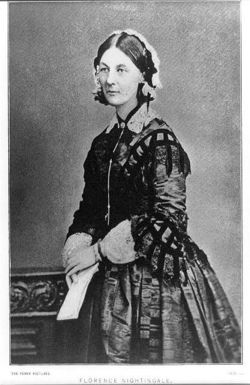
#FLORENCE NIGHTINGALE HOW TO#
COVID-19 Portal While this global health crisis continues to evolve, it can be useful to look to past pandemics to better understand how to respond today.Student Portal Britannica is the ultimate student resource for key school subjects like history, government, literature, and more.From tech to household and wellness products. This Time in History In these videos, find out what happened this month (or any month!) in history.#WTFact Videos In #WTFact Britannica shares some of the most bizarre facts we can find.Demystified Videos In Demystified, Britannica has all the answers to your burning questions.Britannica Explains In these videos, Britannica explains a variety of topics and answers frequently asked questions.Britannica Classics Check out these retro videos from Encyclopedia Britannica’s archives.She was laid to rest alongside the graves of other family members in East Wellow, Hampshire, her relatives having declined a burial in Westminster Abbey. Her training school instructed nurses to follow her hygiene principles, thereby reducing infections in the hospital environment.ĭespite long periods of illness from 1857 onwards, believed to the result of a bacterial infection known as brucellosis, Florence continued to campaign actively for social reform, drafting some 13,000 letters.įlorence Nightingale died at the age of 90, having become the first woman to receive the Order of Merit from King Edward VII, Britain's highest civilian decoration. While this theory was incorrect, her methods nonetheless dramatically improved hygiene standards. Like most of her contemporaries, Nightingale believed that infection arose spontaneously from foul-smelling miasmas. She campaigned tirelessly to improve health standards, publishing over 200 books, reports and pamphlets on hospital planning and organisation, including her most famous work Notes on Nursing (1859).
#FLORENCE NIGHTINGALE PROFESSIONAL#
Four years later she established the first professional training school for nurses, the Nightingale Training School at St Thomas’ Hospital. Occasionally there was outright hostility between them, Nightingale in particular clashing with Sir John Hall, Principle Medical Officer, over his insistence that chloroform not be used in amputation surgery.Īt the end of the Crimean War, Nightingale turned away from military medicine and returned to England in 1856.

Some of Nightingale's colleagues found her difficult to work with, as she was suspicious of military doctors and the Sisters of Mercy: Catholic nuns acting as nurses. She took an analytical approach to medical care, employing ground-breaking statistics and diagrams which demonstrated that more soldiers were succumbing to infectious disease than injuries sustained on the Crimean battlefields. Formulating her own theories around infection, Nightingale worked to drastically reduce the numbers of soldiers who were dying from illnesses such as typhus, cholera and dysentery caused by poor standards of cleanliness.

She requested 80 further nurses and 300 scrubbing brushes, asking the most able patients to scrub every inch of the hospital.

Conditions at the British base hospital in Scutari were appalling and Nightingale immediately reorganised their standards of hygiene and care. In late 1854, following reports about the dreadful conditions and lack of medical supplies affecting injured soldiers fighting the Crimean War, Nightingale was invited by the Secretary of War to oversee the introduction of female nurses into military hospitals in Turkey. In the early 1850s she was working in a Harley Street hospital battling cholera and unsanitary conditions.

Despite opposition from her family, who felt nursing was not a suitable profession for a highly educated woman, Nightingale pressed on with her nursing career. Her religion gave her a strong sense of moral duty to help the poor and, over time, she held a growing belief that nursing was her God-given vocation. Although she is best remembered for her work during the Crimean War (1853-56), Nightingale fundamentally changed the role of nursing in hospitals, and was a key figure in introducing new professional training standards.Īs a child, she was very academic and particularly interested in mathematics. She was born in Florence, Italy, in 1820 and brought up in England. Florence Nightingale is one of the best-known women in Victorian medicine.


 0 kommentar(er)
0 kommentar(er)
